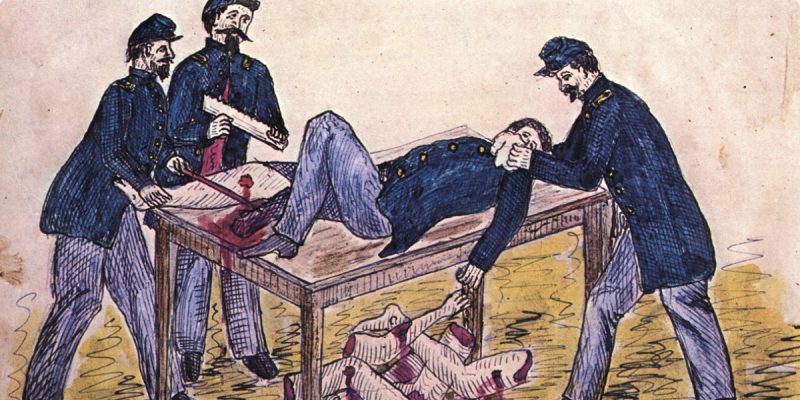Mises Institute, May 19, 2020
Hacksawing the Economy: How Lockdowns Are in the Tradition of Civil War Surgeons
Politicians and government health officials’ justification for decreeing shutdowns of vast swaths of American life has been deterring the spread of COVID-19. According to Federal Reserve chairman Jerome Powell, almost 40 percent of households earning less than $40,000 per year have a member who has lost their job in recent months. Depression, drug abuse, and suicide are spiking as a result of the lockdowns and “shelter-in-place” commands.
Infection rates and deaths have soared despite severe restrictions on daily life. However, politicians and government health officials continue to claim victory because otherwise more people would have been infected by COVID-19. Most of the media coverage applauds politicians and officials who champion extending lockdowns regardless of the collateral damage to American life.
The political response to COVID-19 is eerily similar to Civil War surgeons’ rationales. Amputation was the most common surgical practice during that war, and more than fifty thousand soldiers had limbs hacked off after battles. Amputation was a reflexive “solution,” because limbs were sometimes shattered by Minié balls and also because that was the only trick that many untrained “surgeons” knew. Surgeons were derided as butchers and were usually utterly negligent about hygiene, leading to far more unnecessary deaths.
Surgeons justified fetching out their hacksaws, because otherwise many soldiers would die from their gangrened wounds. It didn’t matter how many soldiers died from unnecessary or botched amputations as long as surgeons didn’t get blamed for deaths from gangrene.
Politicians in many states are justifying their COVID-19 shutdowns with rationales that resemble those surgeons’. It doesn’t matter how many individuals lose their jobs, businesses, or robust health due to the shutdowns. As long as politicians claim that things would be worse if they had not amputated much of the economy, they can pirouette as saviors.
Actually, there is a closer analogy between the Civil War surgeons and contemporary politicians. Politicians have razed much of the economy purportedly to prevent anyone from getting infected at some unknown point in the future. This is like a Civil War surgeon sending his assistants to roam the countryside to seize hapless young men and saw off their arms in order to prevent them from being casualties in future battles.
Here’s how New York governor Andrew Cuomo justified shutting down his state’s economy and confining almost 20 million people to their homes two months ago: “If everything we do saves just one life, I’ll be happy.” At the time of Cuomo’s decree, five or fewer people had tested positive for coronavirus in most counties in New York State. Cuomo’s formula exemplifies how politicians reap media applause for dramatic actions that have little or nothing to do with public safety.
At the same time that Cuomo practically put his state under house arrest, he also ordered New York nursing homes to admit COVID patients. His disastrous dictate contributed to the more than five thousand COVID deaths in New York nursing homes. Cuomo absolves himself, because some states have a higher percentage of COVID fatalities occurring in nursing homes than does New York—but no state has anywhere near five thousand dead in nursing homes. Most of the media is still scoring Cuomo as a heroic benefactor thanks to his shutdown to save “just one life.”
“We have saved lives” is also the self-exoneration trumpeted by Michigan governor Gretchen Whitmer after she imposed the most punitive restrictions in the nation. Whitmer prohibited “all public and private gatherings of any size” (prohibiting people from visiting friends) and also prohibited purchasing seeds for spring planting in stores after she decreed that a “nonessential” activity. (Purchasing state lottery tickets was still an “essential” activity, though.) Many Michigan counties have less than a handful of COVID cases and have had few if any fatalities. But their economies have been obliterated by Whitmer’s statewide decrees, which have driven unemployment up to 24 percent.
In the old days, politicians could always put forward some economist who had discovered a Keynesian “multiplier” to justify more boondoggle spending. Nowadays, “science” is the magic word used to justify any and every restriction on American freedom.
Whitmer, for instance, exonerates herself: “We’ve got to make decisions based on where the science leads us.” Unfortunately, the COVID-19 pandemic has already seen a long series of debacles by “science.” The national response to the coronavirus threat was sabotaged, because incompetent Centers for Disease Control scientists contaminated key samples for creating a test in February and because Food and Drug Administration scientist-bureaucrats blocked innovative private testing. It is also difficult to treat scientists’ warnings and forecasts as originating on Mt. Sinai when there is fierce dispute among experts about the most prudent policies to curb the pandemic.
Another parallel with Civil War surgeons is that contemporary politicians pay no price for the unnecessary damage they inflict. Many crippled Union and Confederate soldiers spent decades hobbling around after the war. It remains to be seen how many millions of Americans suffer long-term handicaps as a result of the draconian decrees now afflicting much of the nation. But it is unlikely that politicians will ever be held liable for the lives they have unnecessarily maimed.
After Civil War battles, the tents where surgeons did their sawing were renowned as one of the most horrible places that many soldiers ever encountered. Even those who recovered from their wounds were often left with perpetual nightmares over the screaming they heard and the sight of the gory stacks of severed arms and legs.
In contrast, the politicians and government health czars who have shut down much of the nation’s economy have not witnessed such traumatic venues. Instead, they have their meetings—perhaps on Zoom—and then issue decrees which their friends in the media are certain to applaud. Unemployment rates are rising even faster than the amputation piles of the 1860s. But the agony occurs far away from the palatial offices that governors enjoy—in quiet homes where families desperately agonize over pending rent and mortgage payments, and in the sinking businesses where owners see their life dreams dying week by week.


Comments are closed.